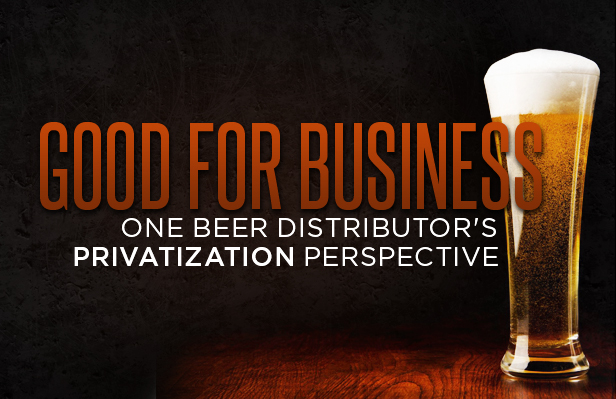Commentary
Good for Business: One Beer Distributor’s Privatization Perspective
Guest Commentary
 What business owner wouldn’t jump at the chance to expand their business? Some of my fellow beer distributors, apparently. The association that is supposed to be representing my business interests in Harrisburg opposes the liquor privatization bill currently in the Senate—a bill that would allow us to expand our selection beyond beer, and into wine and liquor. As a result, they’re standing in the way of a movement to bring Pennsylvania’s 1930s-era alcohol control system into the 21st century.
What business owner wouldn’t jump at the chance to expand their business? Some of my fellow beer distributors, apparently. The association that is supposed to be representing my business interests in Harrisburg opposes the liquor privatization bill currently in the Senate—a bill that would allow us to expand our selection beyond beer, and into wine and liquor. As a result, they’re standing in the way of a movement to bring Pennsylvania’s 1930s-era alcohol control system into the 21st century.
It’s a baffling move. This bill is a clear win for beer distributors, offering us the first shot at purchasing new wine and spirits licenses. And not only will we have the exclusive right to purchase these licenses for the first year and a hefty discount on license fees, but the state will allow distributors to pay for their cost over four years at a reasonable rate of interest.
Any change to the status quo can seem daunting, especially for business owners currently generating a safe and reliable revenue stream who could face new competition. But this legislation will ease the transition to a private market by giving beer distributors several options to ensure we can remain competitive. While the idea of more competition may cause some fear, we can no longer afford to stand in the way of change.
It’s not just about the needs of my select business community. Encouraging distributors to grow their businesses will also benefit all Pennsylvanians. By allowing customers to purchase beer, wine, and spirits at one location (and likely for a lower price than under the existing state monopoly), many Pennsylvanians will stop illegally crossing the border to purchase alcohol.
As it stands, the state loses an estimated $180 million in alcohol sales to other states every year. Bringing these sales back to Pennsylvania will generate significant tax revenue, giving the state more money to spend on services that benefit all residents—like public safety and transportation.
And as the distributors grow and increase their sales, they’ll hire more employees. As other businesses, like grocery stores, expand alcohol sales, they’ll also add new workers to their payrolls. Studies of liquor privatization’s impacts estimate that passage of this bill will create thousands of new jobs across the state and generate millions of dollars in new economic activity and business development.
Privatization will also eliminate many of the burdensome regulations created by the state-controlled system that frustrate customers and distributors. Customers will finally be allowed to buy a six- or twelve-pack of beer rather than an entire case, encouraging them to sample new brews without committing to 24, or as many as 36, cans or bottles. They’ll also be able to enjoy a bottle of wine at a restaurant and take home what they can’t finish, expanding sales for restaurants while discouraging drivers from drinking more than they should, lest their expensive purchase “go to waste.”
At the end of the day, privatization is really just common sense. There’s a clear reason why 48 other states allow private businesses to handle alcohol sales: Government control isn’t effective. The Pennsylvania Liquor Control Board generates revenue by taxing and marking up the alcohol it sells and still ended last year with negative $9.8 million in net assets. Private sales would generate the same alcohol tax revenue, plus added revenue from taxes on new businesses selling alcohol.
That’s why I support legislation that will get government out of the business of selling alcohol. Ending this Prohibition-era alcohol monopoly is a win-win situation for citizens, taxpayers, businesses, and responsible politicians trying to keep Pennsylvania on sound fiscal footing. As a beer distributor, I think that’s something worth toasting to.
###
Cheryl Umberger is the owner of Wet Your Whistle Beverage in Lebanon. She also resides in Lebanon County with her husband and four children.